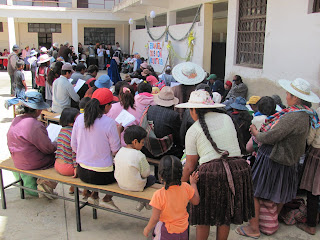For me, one of the blessings of being in someone else’s
home, culture, country, house of worship etc. is having my eyes opened to
another way of seeing, another way of interpreting life and its events. Oftentimes I come away enriched, able to see
more clearly or at least experience more deeply. This is very true for me in my experiences of
death while here in Bolivia.
I have seen very dear loved ones leave this life both from a
distance in the United States, and also here in Cochabamba. I have accompanied people in their sorrow as
they have lost family members. Coming
into mission, I never knew death would be such a prevalent part of my time.
At the end of St. Francis’ life, he wrote a canticle
praising God and all Creation, and at the very end is the most curious part to
me. “ Be praised, my Lord,
for our Sister Death, whom we must all face. I praise and bless you, Lord, and
I give thanks to you, and I will serve you in all humility.”For many people in Bolivia, this transition of death is marked by wearing all black for a year and usually visiting the cemetery on Sundays, bringing flowers to the grave and praying. The poor are also always present at the cemetery, usually young boys or adolescents, people will walk around offering to pray and sing or even play music for the deceased loved one. I have witnessed many people offer these prayers and songs and I’m touched by them every time. In return the people visiting give some money to the people praying as a gesture of appreciation. Of course family members visiting pray too, but the way I see it, it is a way for people who might never otherwise have an interaction to share a moment of accompaniment in times of grief and sorrow, feelings every human being knows no matter where they come from or where they live. There is something in the giving of prayers, in sharing those difficult moments that is beautiful to me.
Looking back on the last 12 months, many of the memories
that stick out to me are around death and the sorrow is heavy to carry, which
is why I don’t think we should ever carry it alone. In mourning, there is also accompaniment by
our community, our friends, our family, and that is what impresses me the most—the
love that shines through, the love shared with the person who has passed on and
the love shared by the ones who remain in this life. One of my favorite books is Tuesdays with Morrie, and one of the
many wise things Morrie said about death was the following:
“As long as we can love each other, and remember the feeling
of love we had, we can die without ever really going away. All the love you created is still there…Death
ends a life, not a relationship.” P174
As we honored the
dead for All Souls’ Day and All Saints’ Day the 1st and 2nd
of November in Cochabamba, I was reminded of the truth in that statement, “all
the love you created is still there”.
Many people prepared tables in their homes with the favorite foods of
the deceased, many more visited the gravesides with flowers and prayers, and
memories were shared.
Something different
that happened this year is that a group of people wanted to remember the souls
of the indigenous people who lost their lives in the process of marching from
the jungle to the high altitude of La Paz protesting the construction of a
highway through their protected territory and national park. Outside my office they set up a table with
pictures and food as a way of honoring the people who passed away and praying
for them.
If you have lost a
loved one this past year, my sincere prayer and hope is that you receive peace
and cherish the love you have with that person because that love never dies but
is always with us.
5 Things I’m Grateful for Today: the ability to be in
Cochabamba and experience the many traditions around death and honoring the
dead; being received into people’s homes with such open and loving arms; the
chance to change and grow; hugs; more hugs; witnessing families who take care
of each other.




































